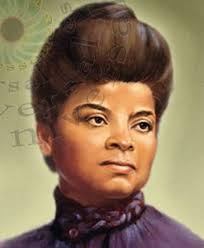|
July 16, 1862 six months before the signing of the Emancipation Proclamation Ida B. Wells-Barnett was born in Holly Springs, Mississippi to parents James and Elizabeth Wells. Ida’s father was a master carpenter and was involved with the Freedman’s Aid Society; her father’s education and experience would help shape her future. Wells-Barnett attended Shaw University at the age of 16 until tragedy struck her family. Both of her parents and a sibling died because of yellow fever. Wells-Barnett was the sole care taker of her remaining siblings so she began teaching at a black elementary school until she was 18. Wells-Barnett and her siblings moved to Memphis, Tennessee in 1882 to live with some of her relatives; this move allowed her to make more money as a teacher in Memphis rather than Holly Springs. She taught school for the Shelby County School system while continuing her education at Fisk University on the side. In 1884 while sitting in a first class seat on a train to Nashville he was ordered to give up her seat to a white person. When she refused she was hauled off the train and arrested. She would later sue the railroad receiving $500.00 in a settlement case. The Tennessee Supreme Court would later overturn the ruling in favor of the railroad. Wells-Barnett would begin writing frequently under the alias “Lola;” she also would begin gaining attention for her wonderful ability to write about race. She became co-owner and editor of the Free Speech and Headlight newspapers in 1889. Well-Barnett was visiting Mississippi when her friend’s grocery store was mobbed and trashed by whites. The owners of the store were jailed because of the incident; the white mob then attacked them while in jail and killed all the store owners. Wells used the power of her pen to educate blacks about what was going on and encouraged them to leave the city of Memphis. Because of Well’s writings over 6,000 blacks vacated Memphis while others boycotted the white business. Wells-Barnett’s life was threatened after she wrote her articles; but she still dedicated her time to traveling to the south learning as much as she could about the lynching’s of blacks. After gathering information she published several articles which only further enraged the savage minds of the whites who hated her. Wells moved to New York because her life was in danger in the south. While in New York she wrote an article for the New York Age highlighting the lynchings of blacks in America. In 1893 Wells-Barnett began lecturing worldwide about the inhumane lynching of blacks in America. Wells-Barnett wrote and circulated a pamphlet exposing the ban of African American art exhibitors at the World’s Columbian Exposition in 1893. Wells’ efforts were supported by Frederick Douglas and Ferdinand Barnett. 1893 was also the year that Wells published her personal examination of lynching’s in America titled; A Red Record. Wells was invited to the White House in 1898 where she campaigned for anti-lynching policies to help African-Americans. Later that year she would marry Ferdinand Barnett, the couple formed a force together to fight the lynching laws of America. In 1896 Wells formed the National Association for Colored Women, which helped protect the black community from the white lynch mobs. After a brutal assault on the black community in Springfield, Illinois Wells attended a conference that would later give birth to the NAACP. Wells-Barnett left the NAACP shortly after its inception because of a lack of action towards practical solutions. Wells-Barnett went on to create the first African-American kindergarten for her community.Ida B. Wells-Barnett truly dedicated her life to fighting injustices against her people. She faced jail, threats to her life, and family tragedies but still remained a champion for her people. She took on America and its unjust policies, even taking her case to the White House to advocate for her natural right to live. Throughout history, only the brave and the ones passionate about their people and true freedom stand up for justice; Miss. Wells-Barnett was one of those heroes. Miss Ida B. Wells-Barnett, we stand on your shoulders. J.A. Ward. Click below for the Ida B. Wells-Barnett video
0 Comments
Leave a Reply. |
Details
Categories
All
Click Here to join our mailing list
|
Contact Us: |
Connect With Us |
Site powered by PIT Web Design


 RSS Feed
RSS Feed



